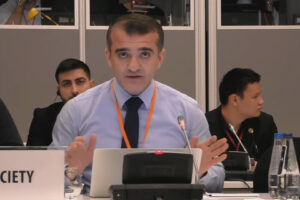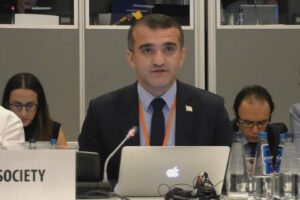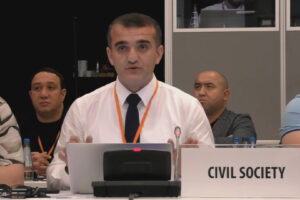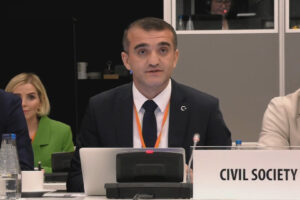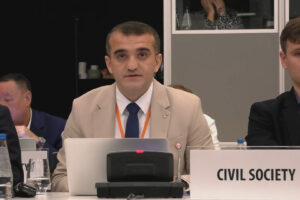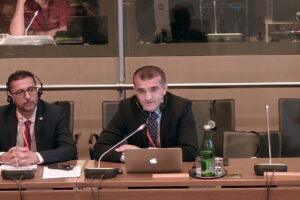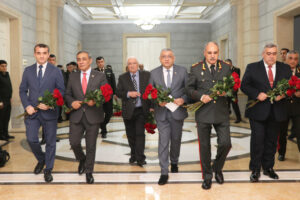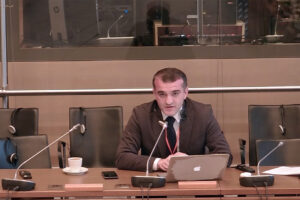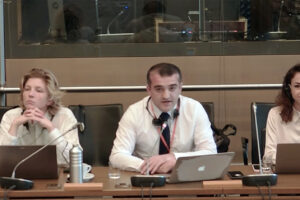“Recent developments opened a new page in Azerbaijan and European relations” – Ahmad Shahidov
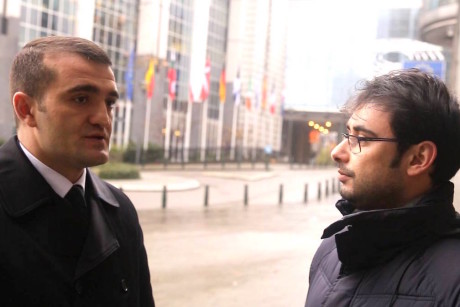
Ahmad Shahidov, head of AIDHR attended groundbreaking gathering dedicated to human rights which took place in Brussels, Belgium on December 10
Head of AIDHR talked to Mammad Gulmammadov, editor in chief of the Olke.az web site
As we know you attended an important meeting on the International Human Rights Day that has been organized by the European Parliament on December 10. Could you more elaborated on details of the meeting?
An important meeting took place at the European Parliament headquarter in Brussels, Belgium on December 10. The main topics of meeting were religious radicalism, terrorism and human rights issues. Representatives around glob had discussions with European parliamentarians on the aforementioned issues. The meeting also featured hearings of reports of UN special rapporteur on freedom of religion or belief, expert of OSCE Office for Democratic Institutions and Human Rights. As I already mentioned, religious radicalism and terrorism were prime issues of the agenda. Human rights advocates mainly from Islamic states noted that in no way combat against terrorism can limit rights of concerning group. There were heated discussions during which I took a floor and noted recent radicalism tendency observed in Azerbaijan.
Talking of religious radicalism, did the meeting feature discussions on recent Nardaran incidents that occurred in Azerbaijan?
Of course, I recall report of UN special rapporteur on freedom of religion or belief in which he highlighted in no way rights of people can be restricted on the pretext of combating against terrorism. Everyone’s freedom of religion or belief has to be ensured. This issue was a little bit ambiguous for me therefore I raised my hand to address my question and touched on measures carried out by Azerbaijani government in Nardaran. I asked, how should Azerbaijani government react in face of emerged challenges? Should it supposed to combat against radicalism and terrorism? Or leave it as it is? Naturally enough UN Reporter said that the case with Azerbaijan is different as it locates in the neighborhood of Russia and Iran. Influences of varous religious tendenceies directed from these countries, in particular negative impacts of ISIS are felt in Azerbaijan. In other word, UN Reporter evaluated Azerbaijani government’s steeps right.
Unless intended measures were carried out the same scenario on religious radicalism which happened in Arab countries could be repeated in Azerbaijan. On the other hand, violation of Muslim rights in Pakistan, India, and Iran even in China has been raised; problems of religious minorities have been highlighted at the meeting. However, both UN and OSCE Reporters highly evaluated Azerbaijan government’s measures implemented in relation to Nardaran incidents.
Prior to this gathering Leyla Yunus, Azerbaijani human rights activist has been released. How was the reaction of European officials, institutions towards this issue? Were there any voiced views?
No doubt, it’s an important development that Leyla Yunus has been released and as a human rights defender it pleases me. For his part, Anne Brasseur, President of the Parliamentary Assembly of the Council of Europe highly valued Azerbaijani government step and expressed his gratitude. He also noted that due to health condition it would be desirable to release other human rights advocates, journalists and other imprisoned ones. Aftermath, OSCE Secretary General and head of the OSCE Office for Democratic Institutions and Human Rights highly valued releasing of Leyla Yunus.
In general, this step is met with appreciation at the European Parliament. This very measure upgraded overall reputation of Azerbaijan on the eve of International Human Rights day on December 10. It would be appropriate if the government reviews releasing of other human rights advocates, journalists and other prisoners. I do hope that Azerbaijan government will take relevant steps.
What is your personal stance regarding releasing of Leyla Yunus?
As a human rights advocate I want all human rights and freedoms of persons are ensured in Azerbaijan. Regardless of his or her occupation, viewpoints and affiliation, courts are expected to treat with their cases fairly. Leyla Yunus and Arif Yunus who are human rights advocates are my colleagues. I am extremely happy that they are released and appreciate decisions of Azerbaijani government and court as they considered the Yunus’ age and health condition. It is also worthy of appreciation that by taking this step Azerbaijani government seeks to upgrade its democratic reputation at the European space. I do hope that this process will go on as it is prerequisite for Azerbaijan’s euro-integration to eliminate drawbacks in the field of human rights.
You attended a number of international conferences very often. I would like to ask, what is the general attitude of European officials towards Azerbaijani representative? In comparison with back to 5 years, is that attitude is changed to the positive or negative side?
Unlike other Post Soviet countries, Azerbaijan has promising reputation. Putting aside its radiant economy, tourism potentials, sport and culture as Azerbaijan made its name known in Europe as a country of sport, culture and country with powerful economy. But what indeed matters in Europe is the state of democracy. In comparison with other former soviet countries, Azerbaijan occupies high places due to the indications of all fields. Azerbaijan could manage to secure freedom of religion or belief, to thrive multiculturalism and tolerance which is hard to observe in other countries.
As for instance, in the Brussels, locals are intolerant towards Muslims. It is considered dangerous to pray at mosques or walking in the street with hijabs is risky. In this respect, Azerbaijan outweighs Belgium. Not matter whether he or she is Muslim, Christian, Buddhist or atheist, he or she can live in my home country without any restrictions and can take whichever position he/she deserves in the society. The notion of human rights is a little bit abstract, each country can make some addition or omission in this notion as the geopolitical location of country may vary.
Although the US and European countries made huge progress in human rights, there are still some gaps in some arrears. Limitation of some rights in these countries has to do with national security issues. With respect to Azerbaijan, the country has to protect its national security. Therefore, the notions of human rights and national security in some cases contradict each other and leave countries in face of challenges. As with every country Azerbaijan faces the same challenge. In order to protect its national security, its citizens Azerbaijan to some extend has to limit human rights and freedoms temporarily. Let’s take recent incidents in Nardaran, I do consider Azerbaijani government’s measures appropriate, otherwise we could experience the same scenario which occurred in Iraq, Syria and other countries.
Mr. Shahidov, in the end I would like to thank you for your comprehensive interview.
Thank you very much.
“Recent developments opened a new page in Azerbaijan and European relations” – Ahmad Shahidov
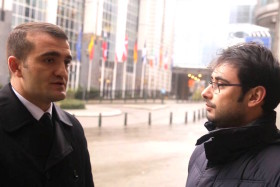 20 December 2015
20 December 2015
Ahmad Shahidov, head of AIDHR attended groundbreaking gathering dedicated to human rights which took place in Brussels, Belgium on December 10
Head of AIDHR talked to Mammad Gulmammadov, editor in chief of the Olke.az web site
As we know you attended an important meeting on the International Human Rights Day that has been organized by the European Parliament on December 10. Could you more elaborated on details of the meeting?
An important meeting took place at the European Parliament headquarter in Brussels, Belgium on December 10. The main topics of meeting were religious radicalism, terrorism and human rights issues. Representatives around glob had discussions with European parliamentarians on the aforementioned issues. The meeting also featured hearings of reports of UN special rapporteur on freedom of religion or belief, expert of OSCE Office for Democratic Institutions and Human Rights. As I already mentioned, religious radicalism and terrorism were prime issues of the agenda. Human rights advocates mainly from Islamic states noted that in no way combat against terrorism can limit rights of concerning group. There were heated discussions during which I took a floor and noted recent radicalism tendency observed in Azerbaijan.
Talking of religious radicalism, did the meeting feature discussions on recent Nardaran incidents that occurred in Azerbaijan?
Of course, I recall report of UN special rapporteur on freedom of religion or belief in which he highlighted in no way rights of people can be restricted on the pretext of combating against terrorism. Everyone’s freedom of religion or belief has to be ensured. This issue was a little bit ambiguous for me therefore I raised my hand to address my question and touched on measures carried out by Azerbaijani government in Nardaran. I asked, how should Azerbaijani government react in face of emerged challenges? Should it supposed to combat against radicalism and terrorism? Or leave it as it is? Naturally enough UN Reporter said that the case with Azerbaijan is different as it locates in the neighborhood of Russia and Iran. Influences of varous religious tendenceies directed from these countries, in particular negative impacts of ISIS are felt in Azerbaijan. In other word, UN Reporter evaluated Azerbaijani government’s steeps right.
Unless intended measures were carried out the same scenario on religious radicalism which happened in Arab countries could be repeated in Azerbaijan. On the other hand, violation of Muslim rights in Pakistan, India, and Iran even in China has been raised; problems of religious minorities have been highlighted at the meeting. However, both UN and OSCE Reporters highly evaluated Azerbaijan government’s measures implemented in relation to Nardaran incidents.
Prior to this gathering Leyla Yunus, Azerbaijani human rights activist has been released. How was the reaction of European officials, institutions towards this issue? Were there any voiced views?
No doubt, it’s an important development that Leyla Yunus has been released and as a human rights defender it pleases me. For his part, Anne Brasseur, President of the Parliamentary Assembly of the Council of Europe highly valued Azerbaijani government step and expressed his gratitude. He also noted that due to health condition it would be desirable to release other human rights advocates, journalists and other imprisoned ones. Aftermath, OSCE Secretary General and head of the OSCE Office for Democratic Institutions and Human Rights highly valued releasing of Leyla Yunus.
In general, this step is met with appreciation at the European Parliament. This very measure upgraded overall reputation of Azerbaijan on the eve of International Human Rights day on December 10. It would be appropriate if the government reviews releasing of other human rights advocates, journalists and other prisoners. I do hope that Azerbaijan government will take relevant steps.
What is your personal stance regarding releasing of Leyla Yunus?
As a human rights advocate I want all human rights and freedoms of persons are ensured in Azerbaijan. Regardless of his or her occupation, viewpoints and affiliation, courts are expected to treat with their cases fairly. Leyla Yunus and Arif Yunus who are human rights advocates are my colleagues. I am extremely happy that they are released and appreciate decisions of Azerbaijani government and court as they considered the Yunus’ age and health condition. It is also worthy of appreciation that by taking this step Azerbaijani government seeks to upgrade its democratic reputation at the European space. I do hope that this process will go on as it is prerequisite for Azerbaijan’s euro-integration to eliminate drawbacks in the field of human rights.
You attended a number of international conferences very often. I would like to ask, what is the general attitude of European officials towards Azerbaijani representative? In comparison with back to 5 years, is that attitude is changed to the positive or negative side?
Unlike other Post Soviet countries, Azerbaijan has promising reputation. Putting aside its radiant economy, tourism potentials, sport and culture as Azerbaijan made its name known in Europe as a country of sport, culture and country with powerful economy. But what indeed matters in Europe is the state of democracy. In comparison with other former soviet countries, Azerbaijan occupies high places due to the indications of all fields. Azerbaijan could manage to secure freedom of religion or belief, to thrive multiculturalism and tolerance which is hard to observe in other countries.
As for instance, in the Brussels, locals are intolerant towards Muslims. It is considered dangerous to pray at mosques or walking in the street with hijabs is risky. In this respect, Azerbaijan outweighs Belgium. Not matter whether he or she is Muslim, Christian, Buddhist or atheist, he or she can live in my home country without any restrictions and can take whichever position he/she deserves in the society. The notion of human rights is a little bit abstract, each country can make some addition or omission in this notion as the geopolitical location of country may vary.
Although the US and European countries made huge progress in human rights, there are still some gaps in some arrears. Limitation of some rights in these countries has to do with national security issues. With respect to Azerbaijan, the country has to protect its national security. Therefore, the notions of human rights and national security in some cases contradict each other and leave countries in face of challenges. As with every country Azerbaijan faces the same challenge. In order to protect its national security, its citizens Azerbaijan to some extend has to limit human rights and freedoms temporarily. Let’s take recent incidents in Nardaran, I do consider Azerbaijani government’s measures appropriate, otherwise we could experience the same scenario which occurred in Iraq, Syria and other countries.
Mr. Shahidov, in the end I would like to thank you for your comprehensive interview.
Thank you very much.
 @
@










